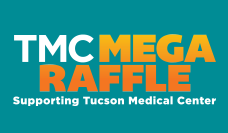Contributing to cardiac rehabilitation
It is not how you start, but how you finish
Less than a week – that’s all it took for Clif Nelson to go from romping outdoors with friends to being prepped for coronary bypass surgery.
Like many cardiac patients, Nelson wasn’t sure what life would be like after his procedure. Cardiac rehabilitation made all the difference, providing the education and activity that improved his overall health and outlook – and it introduced him to a new family.
A reason to give
Nelson’s story is a reminder of the importance of giving.
When you purchase a ticket for the TMC Mega Raffle, you are giving to all areas of the hospital, from surgery to rehabilitation and everything in between. These funds support vital programs, such as the TMC CardioVascular Center, which has one of the most active cardiac rehabilitation centers in Arizona.
A routine injury
Nelson injured his torso during a desert excursion with friends nearly seven years ago. When the pain didn’t go away the next day he headed for the emergency room where standard tests led to an unexpected discovery.
“They said it was just a bruised rib, so I got up to leave and they told me to sit back down,” Nelson said. “I had an irregular heart beat and needed more tests.”
Cardiac diagnostics showed that two of Nelson’s coronary arteries were almost completely obstructed by plaque build-up. “I needed a coronary artery bypass graft (CABG) right away – that’s full blown open-heart surgery.”
After open-heart surgery
Men are more likely to need CABG procedures because more men experience cardiovascular disease than women. Cardiac rehabilitation can play an important role in recovery as well as future physical and mental health.
“The benefits of cardiac rehabilitation are well documented in many studies,” said Lucy Mbugua, TMC cardiac rehabilitation supervisor. “For patients who complete the entire program, mortality is reduced by 50 percent and hospital readmissions are reduced by 25 percent. Cardiac rehabilitation patients also experience fewer symptoms like chest pain and fatigue – they recover faster.”
More than a gym
Cardiac rehabilitation has been proven to reduce the risks of a future cardiac event. TMC patients receive information about the program before they are discharged, although, anyone can participate in the program with a doctor’s order.
“The TMC cardiac rehabilitation staff came to see me while I was recovering in the hospital – I thought it was just exercise but it’s more than a gym,” Nelson said.
For Nelson, the lifestyle changes were just as important as the workouts and easy too. “Before cardiac rehab I really wasn’t aware of how bad salt and sugar were for me and that so much of them are in many foods. Honestly, I don’t miss it.”
Mbugua explained that TMC Cardiac Rehabilitation patients receive diet and lifestyle education in addition to physical training. “We want to help shape the way patients look at, and feel about, heart health because the whole person must be addressed to achieve the best results,” she said.
Custom fit
Every patient receives an individualized exercise routine based on their condition and health goals. “Clinical professionals will be monitoring your heart rate, blood pressure and other vital signs throughout your regimen,” Mbugua said. “This ensures safety and that the patient makes incremental progress, getting stronger each time.”
A big family
TMC Cardiac Rehabilitation also offered a surprising benefit to Nelson. “We’re really a big family,” he said. “We welcome the new folks every week. We know what they are going through and that helps.”
According to Mbugua, depression is common after a cardiac event or surgery. “In addition to the exercise and improved diet, the social aspect of the program has a positive emotional benefit for many patients,” she said.
Clean bill of health
Nelson graduated the program long ago, but enjoyed the exercise routine and interaction so much that he still attends five times a week.
“At my five year check-up, I received a completely clean bill of health from my cardiologist,” said Nelson. And he isn’t the only one happy to hear about his better health.
“It is so rewarding to see the successes,” said Mbugua. “When I see the health transformation throughout the program, I know we have made a difference in someone’s life.”
Nelson has an important piece of advice for men who have recently had heart surgery. “It is not how you start, but how you finish.”
Touching lives
“The generosity of Mega Raffle donors touches lives every day,” said Steve Siwik, TMC Foundation board chair. “We are honored to support all areas of the hospital, ensuring our staff at TMC has the tools and technology to make a difference in the lives of our patients.”
